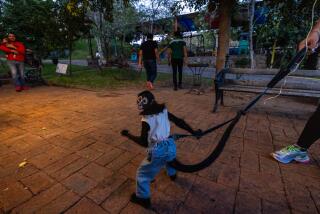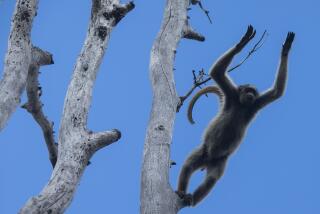Madagascar’s political turmoil takes toll on forests
Reporting from Berenty, Madagascar — She was the spy who was undone by a furry little creature with huge, hypnotic eyes.
It was the early 1980s, and a young Madagascan scientist named Hanta Rasamimanana had been dispatched by her pro-Soviet government to spy on a group of Americans working in the private Berenty Reserve in the southern part of the country.
Instead of finding out what the Americans were really up to, she fell in love with the creatures they were studying: lemurs.
Rasamimanana remembers how, on her first mission as a researcher-cum-spy, she paid more attention to American primatologist Alison Jolly and her comments about the primates than to her bosses’ orders.
“She gave us instructions we must not lose our lemurs,” she recalls. “I stayed with them because I was happy to have them under my eye. . . . It was really interesting to look at their social relationships. They really behave like humans.”
Two decades later, the animal would have the same mesmerizing effect on millions of fans of the DreamWorks animated movie “Madagascar.” But in real life, the lovable lemur faces an unprecedented threat.
The endless virgin forests depicted in the film have been decimated, and this African island nation has been left paralyzed and lawless in the wake of a coup this year -- perfect conditions for the pillaging of the lemurs’ remaining habitat.
There are dozens of lemur species in Madagascar, 99 at last count, some of them not much bigger than a mouse, most of them critically endangered. The largest lemurs are most vulnerable, because they need more food.
Environmentalists predict that Madagascar will be the next Haiti, a country suffering catastrophic deforestation and environmental degradation because of poor governance.
The lemurs face multiple threats.
In some parts of the country they’re considered bad luck, which means that villagers kill them on sight. In other parts, where they’re not taboo, they’re hunted for food.
Climate change and deforestation are leaving the landscape parched and are destroying habitats.
Logging mafias, alleged to have close links to the government and to Chinese traders, bribe or threaten overstretched, poorly paid park rangers and take precious timber, with devastating results.
The current government was installed in March by the military, which toppled President Marc Ravalomanana and replaced him with his rival, Andry Rajoelina, then the mayor of the capital, Antananarivo. Negotiations on a power-sharing compromise have stalled.
The U.S., the European Union and the World Bank responded to the coup by imposing sanctions, including suspension of USAID’s environmental programs. USAID, the U.S. State Department’s development agency, had been supporting the Ministry of the Environment, Water, Forests and Tourism, helping the country protect its forests and fauna.
Madagascar depends on aid for about 40% of its budget and 70% of investment spending.
“We run the risk of losing hundreds of species,” said Niall O’Connor of the World Wide Fund For Nature. “If that’s the case, why are donors withdrawing funds? We have to make sure donors understand that the humanitarian needs of the farmers are linked to the protection of the environment around them.”
In January, the former government allowed the export of precious ancient ebony and rosewood trees from national parks, but only those felled by cyclones.
Now, like a person dying of starvation, Madagascar has begun to consume itself. With the government desperate for funds, and with lawlessness and corruption rife, the January decree has led to catastrophic plundering of Madagascar’s forests.
Some environmentalists warn that if logging continues at the current rate, the forests will be gone within a few years.
When one giant rosewood is cut, loggers cut a swath through virgin forest to get the timber out, destroying habitats, threatening rare species and allowing invasive species to gain a toehold.
Since the political crisis in March, thousands of people have swarmed in to cut down trees. They kill lemurs for food.
“In Madagascar everywhere, they are eating lemurs. It’s taboo, but now everybody’s hungry,” Rasamimanana says. “In the last three months, they have been logging all this precious wood. When the guards come, they kill the lemurs as a challenge -- as if to say, ‘There! What are you going to do?’ ”
She believes the unbridled logging, mainly in the north, will wipe out some lemur species: There are only about 100 silky sifaka lemurs left in Madagascar.
“In the north there are some very rare species. Here in Madagascar when there’s political change, everything is burning in the forest.
“They burn. They cut. They kill. They destroy.” Rasamimanana’s voice breaks.
In the Berenty Reserve, where six lemur species are found, ring-tailed lemurs hurtle through the trees as though attached to invisible wires, some carrying babies on their backs. Some of them, bold and curious, approach and stare with their luminous eyes.
Her face softening, Rasamimanana calls the lemurs. At first she emits a low cluck, deep in the throat.
Summoning another species, she mews like a forlorn cat. And for the sifaka, she calls, “Sifak! Sifak!” The primates pause and listen to the call. With pointed, elegant faces and white fluffy fur, the sifaka leap to the ground, moving swiftly in a lopsided hop.
She’s skeptical about the chances of changing the older generation of Madagascans, who see lemurs as either a pest or a curse. But she hopes that teaching young people about the animals will be the lemurs’ salvation.
“I don’t talk to people who won’t listen. If you tell them, ‘Your offspring will have nothing left,’ they say, ‘That’s their business.’ ”
Rasamimanana has translated several children’s books about lemurs, written by primatologist Jolly, that are being distributed in Madagascan schools. In one Berenty elementary school, children excitedly read the books, while Rasamimanana stands at the back, giggling over their enthusiasm.
But she wonders what will be left by the time they’re grown.
“It’s really huge deforestation,” she says. “It makes me feel mad because I can’t do anything. And something unique will be lost.”
More to Read
Sign up for Essential California
The most important California stories and recommendations in your inbox every morning.
You may occasionally receive promotional content from the Los Angeles Times.









